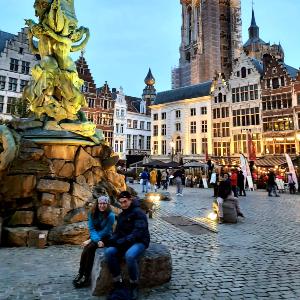Out into the big, wide world
9 Jan 2023
From the Netherlands to Canada – Where LMU students go and what matters during their stays abroad.
9 Jan 2023
From the Netherlands to Canada – Where LMU students go and what matters during their stays abroad.

realized her dream of studying abroad during the winter semester. | © Tamara Müller
At the dawn of a new year, Tamara Müller can look back on an exciting time: For four months, the business education student from Munich for whom English is an elective subject has, with her 13-year-old daughter, been living in Leeds, England, under the aegis of the Erasmus program. “It was a fantastic time and a unique, tremendously enriching experience – not just for me, but for my daughter too,” she says.
Müller attended courses in English and her specialist subject at the University of Leeds, enhanced her knowledge of English and got to know new people. She and her daughter, who spent four months at an English school, also did a lot of short trips to see something of the country.
Tamara Müller is one of more than 1,200 “outgoing” LMU students who, each year, spend one or two semesters abroad. They can choose from more than 550 partner universities worldwide, with the LMUexchange and Erasmus+ programs facilitating exchanges. Irrespective of LMU’s partnerships, students can, of course, also apply to attend any university in the world.
At LMU’s International Office, Claudia Wernthaler supervises outgoings under the Erasmus+ program. It was she who advised Tamara Müller on her stay abroad. Wernthaler stresses that an exchange semester gives students far more than just language skills and teaching in their chosen subject: “A stay abroad is an experience for life. The students get to know the host country but also come into contact with fellow students from many different countries, sharing in their cultural diversity. This can contribute to openness, tolerance and a sense of belonging, of solidarity – all things we need now more than ever.”
You send people out, and they come back changed, with a broader understanding of people, society, the world in which we live.Dr. Harald David, Head of the LMUexchange unit
Wernthaler’s colleague Dr. Harald David is head of the LMUexchange unit that provides advice on studying abroad. He helps students who want to study at a partner university outside Europe with their applications. He loves his job: “You can really change things,” he says. “You send people out, and they come back changed, with a broader understanding of people, society, the world in which we live.”
David’s most important piece of advice for students? If you want to study or do an internship abroad, get it organized as early as possible – roughly a year and a half before you plan to go there. “The application process takes time, and the financial side needs thorough preparation as well,” he says.
Most students opt to go abroad in the third year of their studies. “By that time, they have acquired a basic knowledge of their subject and can reap the greatest benefits from the academic offerings of partner universities,” David notes. “So it is important to start thinking about whether you can imagine studying abroad and where you would like to go as early as the first semester.”
“Universities in smaller cities in particular often provide an exceptionally intense exchange experience,” according to Claudia Wernthaler from the International Office. “It doesn’t always have to be Rome or Paris.” She and Harald David both advise students to find out as much as they can about the university where they want to study, and to think about how that university fits their own academic profile. Students who do that, they point out, have the best chances of seeing their application accepted.
These were precisely the issues that preoccupied Antonia von Ellerts as she planned her year abroad. She was studying medicine in Munich, and it turned out to be difficult to find a partner university where she could acquire the certificates she needed at LMU. “But I felt it was much more important to broaden my horizons and add a specialist area that perhaps tends to be overlooked in Germany,” she says. Von Ellerts has always been interested in nutrition. And, at Dalhousie University in Halifax, Canada, she found a program that enabled her to deepen her knowledge of this subject. Studying health promotion, she signed up for courses in human nutrition, disease prevention and human sexuality, alongside a course in French.
For me, it is hugely rewarding to step back from the rat race for a year and take the liberty of pursuing my own academic interests, aside from what is staked out in my study curriculum.Antonia von Ellerts , Medical student
“At the start, I was sometimes afraid I might fall through the cracks,” she admits. She now knows better: “On the contrary: For me, it is hugely rewarding to step back from the rat race for a year and take the liberty of pursuing my own academic interests, aside from what is staked out in my study curriculum.” She knows that she will not be able to have all her certificates credited to her studies in Germany. For that, though, she can now write papers in English, has familiarized herself with a different university system, different ways of learning, thinking and working, and has added new strings to her bow as a medical student.
By no means least, she has learned to venture beyond her comfort zone and face up to new challenges. “For a whole year, I am free to arrange my study plan exactly how I want it,” von Ellerts says. “I am benefiting from that in my studies and as a person – I am enjoying every day here.”

would love to extend her stay in the Netherlands. | © Milena Hofmeister
Milena Hofmeister likewise tells how enriching it is to find your way around a different culture. The student of general and comparative literature is currently spending a semester at the University of Utrecht in the Netherlands. Her hope was that this stay abroad would help her improve her command of Dutch but also advance her studies. “Of course, you could just assume that the Netherlands and Germany are culturally very similar. And at first glance, that is true,” Hofmeister says. She nevertheless adds that there are an infinite number of differences large and small, especially in the academic milieu. “If you go somewhere on your own, somewhere completely unfamiliar, you get much more out of yourself than you would at home,” she affirms. “I have become much more spontaneous and have learned to just get things done.”
Her stay in Utrecht is already nearing its end. If she could, she would extend her time here: She is so happy here! However, her bachelor’s thesis – and a job as an undergraduate assistant – await her back in Munich. Hofmeister feels her time in Utrecht has been so beneficial that she would like to go abroad again during her master’s degree course – this time perhaps outside of Europe.
Antonia von Ellerts underscores how much the advice of the LMUexchange helped her prepare for her year in Halifax. “I very quickly became acclimatized in Canada,” she says, “because I had received good advice from the LMUexchange. Thanks to the program, I had also been able to talk to people who had been here before me. That was incredibly valuable.”
The unforgettable time I have had here was definitely worth all the effort.Milena Hofmeister, Student of literary studies
Milena Hofmeister’s advice is, during the preparatory phase, to get together with others who are also planning a stay abroad, so that you can all repeatedly remind and encourage each other to press ahead with the application. One of the hardest challenges was finding an apartment in Utrecht while still in Germany. “You are forced to look for assistance, and that is another way to get to know people,” she recalls. “The unforgettable time I have had here was definitely worth all the effort.”
I would recommend it a stay abroad anybody, especially students with children.Tamara Müller, Student of business education
Tamara Müller likewise encountered a number of challenges when starting out in Leeds: With everything from finding somewhere to live to enrolling her daughter at school, she again and again came up against bureaucratic hurdles, not just because of the new Brexit regulations. “But it was really worth it,” she smiles. “I would recommend it to anybody, especially students with children. I became a mother at a young age, so the idea of a stay abroad seemed like a distant dream for me. I am really glad that I stuck at it and never gave up.”
The fact that everything worked out fine in spite of various adversities is thanks in part to Claudia Wernthaler and Claudia Agne, her contacts at the International Office, who were there to help in every situation. “Both of them pulled out all the stops whenever I ran into difficulties. What they did went far beyond ‘working to rule’,” Müller acknowledges. “In the end, a solution was found for literally every problem, however complicated it may have seemed in the beginning. That alone is an amazing experience.”
Workspace for students: Study abroad